Creating Utopia: An Interview With Jason Falkner
Published on July 30th, 2008 in: Current Faves, Interviews, Issues, Music |Interviewed by Less Lee Moore
If I’ve ever made a mix CD for you, chances are, there’s been a Jason Falkner song on it. Whenever I’m asked to list my favorite musicians, he’s always included. But when it comes to the question of, “what does he sound like?” I am stumped. He sounds like. . . well, he sounds like Jason Falkner. When you hear his work, you just know it’s him. Then he has to go and outdo himself by writing his own songs, performing all the instruments himself, singing lead and background vocals, and producing and engineering everything.
Although his musical output has been informed by many different influences, he has managed to create a style all his own. His latest album, 2007’s I’m OK. . . You’re OK, is his best work to date, combining beautiful, catchy melodies with heartfelt (and often heartbreaking) lyrics. Jason Falkner is also very witty, which is always a bonus in my mind, and which definitely came across in my recent interview with him.
![]()
Photo © RockPaperPixels
Popshifter: So you’ve just released Volume II of Bedtime With The Beatles. There is a quote from Paul McCartney on the Amazon.com entry for the album which says, “I very much enjoyed the first Bedtime With The Beatles and wish Jason all the best with this follow-up. It certainly works—it put me to sleep.” Does reading or hearing a quote like that validate your entire career?
Jason Falkner: (laughs) Very very fair question and the answer is yes, I feel validated by that. As my friends say, “you can just fold your arms over your chest and be lowered into the earth now.” It’s pretty exciting. To my knowledge there really aren’t any posthumous Beatles projects that have been endorsed. So that puts me in a pretty cool little club, possibly of one.
I worked with Paul on his record Chaos and Creation in the Backyard and I got to hang out with him for about two weeks and listen to him tell amazing stories. There isn’t a story he tells that isn’t amazing, historically. At that point I had given him a copy of the first volume [of Bedtime With The Beatles] that I did, and he freaked out, and kinda wouldn’t stop talking about it, and it was just this amazing reaction which I didn’t anticipate.
Because we all know that there are a million Beatles things out there that don’t have anything to do with the band. He really listened to it and made all these incredibly detailed comments, told me how much he was flattered that I made it. I ensured him that indeed, all the flattery belonged to him.
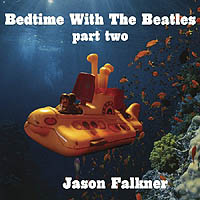
My friend David Sardy who is a record producer and who has a new kid, said, “I heard this record that you did and why did I never hear of this before? It’s amazing and I can’t stop listening to it. And it mellows out my kid, but I’m totally into it.” I told him that I wished Sony had been able to do more with it in terms of marketing. He told me, “You should make another album. I’ll give you my studio for a month.”
So I went to his vintage recording studio here in Hollywood and just went nuts. I did the whole thing in about three weeks. While I was there, there was a film director there also. He was upstairs on the headphones, listening to me working, and he came down and said, “Dear lord, what is this project?” I told him and he said, “I know a guy that works with Yoko and those people should hear this record.” I was like, “Absolutely!”
Then I remembered that I actually know people at Paul’s production company so I just emailed them and asked, “Do you think Paul would be interested in giving me a quote?” He emailed me and said, “Hey, good to hear from you. Please send me a couple of MP3s.” So it was literally like, two emails back and forth.
I mean, it’s kind of a cheeky quote, too, which is very him, but I know from his reaction to the first volume that it’s not meant to be as cheeky as it sounds. So that was pretty exciting.
Popshifter: Why did you choose some these particular songs on this volume? There are some there that I wouldn’t necessarily have thought of, like “Hey Jude,” for example.
Jason Falkner: For the first one I kind of picked through the catalogue a little bit more deliberately for things that I knew I could just slow way down and take them into outer space. For that one, Sony only controlled part of the Lennon/McCartney catalogue, so I couldn’t do any George Harrison songs. I was like, “Oh, absolutely, I’m going to do ‘Here Comes The Sun’,” and Sony was like, “No, actually, you can’t do any Harrison.”
So I was able to do them on this volume. It was a little more difficult to weed through songs and do it again. But also this volume doesn’t have the same limitations I had placed on me with the first one, which was that it had to be so narcotic. This new one is a little bit more exciting, in terms that it has more up-tempo, surprise moments. I kind of abandoned the restrictions that it had to be a lullaby sound. I didn’t really follow that too closely on the first one anyway, because I just don’t really rock lullabies.
Popshifter: (laughs)
Jason Falkner: It was difficult. There was one song that I started but which just wasn’t working. If you’re doing a record of ten songs and one of them you have to scrap, those are pretty good odds. I started doing “Day Tripper” and I made it this weird, bubbly electronic thing but it just didn’t work.
Popshifter: “She’s Leaving Home” was my favorite Beatles song when I was a small child. I liked all the ones with silly lyrics, so I don’t know why I liked that one so much. I would make my mom play it and then I’d cry and she’d ask, “Why do want to hear that?”
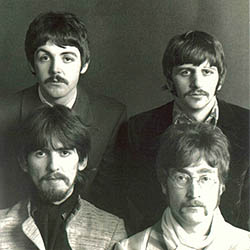
Jason Falkner: (laughs) I know! “What are you doing to yourself?” It’s really sad but it’s just shockingly beautiful, the melody of that and the melancholy energy of it is just amazing. But you do kind of wallow in it.
Popshifter: You had said with Volume I that you were uncomfortable with even doing Beatles covers because you don’t always like it when people revisit The Beatles. Is there a reason you feel The Beatles specifically shouldn’t be revisited or is that just your general feeling with bands that you admire or who have influenced you?
Jason Falkner: It’s kind of (b). It’s a general rule of mine, but at the same time, in the pantheon of bands that I just worship. . . I kind of feel like it’s a religion. It would be like rewriting the Bible, and who’s allowed to do that? I think the Beatles are at the top of that list, so that’s why I’m so vehement about that. (laughs)
But at the same time, I just would never cover a Beatles song in my rock band. And it’s the obvious thing as well; like, don’t even try that. They did it as well as it could be done; nobody will ever make an impact like The Beatles, Stones, The Who, Bowie, The Kinks, all these bands that I love. So just leave it alone.
And in fact, you guys, too. In the Beatles. Leave it alone. Don’t regroup, don’t do it again. You can’t do it again.
Popshifter: (laughing) Right.
Jason Falkner: But being that this is such a different interpretation, with a different intention, it was a lot more acceptable to me.
Popshifter: Are there any Beatles covers that you like, that you think add a different spin to the original?
Jason Falkner: Nothing springs to mind. I can’t even say I like any of the Moog records that cover The Beatles.
Popshifter: I’ve never heard those.
Jason Falkner: They’re not very good.
Popshifter: (laughs)
Jason Falkner: In a weird way, that’s kind of what my Beatles covers are like because it’s so synth-heavy.
Popshifter: But not like those elevator music covers from the 60s and 70s, like “Blue Velvet” where they would sing one line of the chorus and just hum the rest. I’m glad you didn’t go that route.
Jason Falkner: Right. In that genre, there is generally like a humor element, where it’s kinda funny, and then you never want to hear it again.
Popshifter: (laughs)
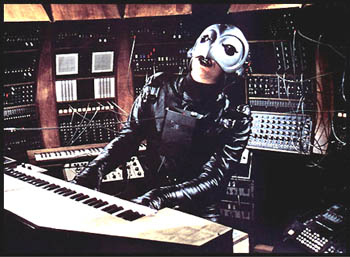
The Phantom of the Paradise, 1974
Jason Falkner: It’s like a one-listen joke. I just don’t feel like doing that to anything that I love. I know a lot of people who do, who are really campy. I mean, I love campy stuff. I love Phantom of the Paradise and a lot of glitter rock—I adore The Sweet—but it’s not good in this context.
Popshifter: You put out I’m OK. . . You’re OK in 2007. There is a keyboard motif on the song “Say It’s True” that reminds me a lot like “Lucy in the Sky with Diamonds.” Was that intentional or not?
Jason Falkner: No, it wasn’t intentional at all.
Popshifter: Do you find you quote things without meaning to? Just because your influences are so close. . . and I don’t mean that in a negative way at all.
Jason Falkner: I’m pretty aware and adamant about not sounding like something. I mean, obviously I’m using the same kinds of vintage instruments. I’m using a lot of similar sounds and literally, the same instruments.
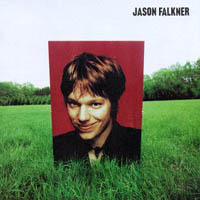
Author Unknown, 1996
But if I play something for someone and they go, “Oh, that sounds like. . . ” or I realize it does, I’ll go, “Oh shit, that sounds like whatever!” I’ll actually change it, just because I’m really trying to do something new. . . within the context of this kind of classic, vintage songwriting thing that I love. I think that somebody has to carry that torch because it’s an exciting thing. I think pop, or whatever you want to call it—pop/rock songwriting—has kind of all been done. So it’s kind of like, pick the era that you love and just mine that. Not trying to rip things off.
But I kind of live in (laughing) like, 1967 to 1983. But I also try to make things new and innovative. I did have a song once called “Miss Understanding” and I was really excited about this one part of the song. And then I was playing pool with my friend and all of a sudden a Green Day song came on the jukebox. There was a part in the song, like their pre-chorus, and I had accidentally picked that out of the air and ripped it off.
And I was like, “Fuck!” Of all the bands, Green Day.
Popshifter: (laughs)
Jason Falkner: And so I went home and changed it.
Popshifter: I don’t think of you as quoting things in a “wink wink” way. Not that that’s bad, but I don’t think of your music in that way.
I don’t know how you feel about this, but I think there is a difference between bands who talk about their influences and bands they love, who will weave references into their songs and bands who will just blatantly steal from others and then claim they’ve never heard of the other bands.
Like that guy Peter Schilling who had that song “Major Tom” in the ’80s.
Jason Falkner: Exactly!
Popshifter: And he tried to say he’d never heard the Bowie “Space Oddity” song. Like come on!

Jason Falkner: I know, he’s talking about an astronaut in space named Major Tom. Really? (laughs) No I know. Or like Lenny Kravitz saying, “I’m not really familiar with John Lennon.”
Popshifter: What? He said that?
Jason Falkner: He said that on [the] Arsenio Hall [Show]. I will never forget this.
Popshifter: Oh my god, I wish I’d seen that.
Jason Falkner: There are a lot of people who will listen to a record and then just rip it off. I actually never listen to any other music when I’m writing and recording except—and I rarely even do this—when I want to get a certain sound, when basically I’m referencing the mix.
That thing with Lenny Kravitz just kills me. I think there might’ve been like a gasp in the audience, like, “You’re kidding me.”
Popshifter: Audible gasp! (laughs)
Jason Falkner: Yeah, someone was just like, “Boo!”
Popshifter: In terms of your most recent album. . . I had heard the demos a few years back and the only song that made it to the album was “This Life of Mine.” Why did you scrap those demos? There is a huge difference in tone between the demos and the album. Did that have any bearing on why the last album has all new songs?
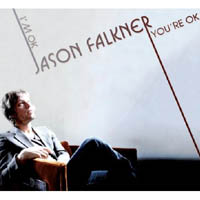
Jason Falkner: The demo disc that was floating around has songs from as far back as the late ’90s. None of the songs on that disc were ever part of a collection that was going to be a record; it was just me recording songs. I’m always recording and if someone kicks my ass hard enough to give me a deadline, I’ll put together whatever I’m excited about at the time.
I don’t listen to everything I’ve done and pick songs for a record. It’s just whatever I’m excited about at that time, and then I’ll re-record them or whatever.
For example, that song “Princessa” is something that I love. That will probably be on the next record. I’ve done three or four completely different recordings of that song. The most recent one I did with my friend David Holmes, who I worked with on the Ocean’s Twelve and Ocean’s Thirteen soundtracks. He’s a producer and just an all-around good guy. When he gets behind something everyone else gets behind it, because he’s got that contagious cheerleader thing. He freaked out about that song so we did a version of it and that will probably be on this next record.
Even “This Life of Mine”. . . I didn’t even listen to that first version again. I was just drinking a little bit of wine and I had this guitar from the 50s I’d just bought, and I had tuned it weird and thought, “I’m going to do a different version of that song.” So I did and I just loved it. That was also a really late inclusion to the record.
Popshifter: In particular the song “NYC” reminds me of some stuff from the Bliss Descending EP. Was that written back then or is it more recent?
Jason Falkner: That was more recent; I think that was written around 2005 or 2006. If something triggers me and gets me excited about writing a song. . . my tastes are very wide. It’s more like a music historian’s taste or a producer, whose job it is to understand all different types of music, from bebop to classical to D.C. hardcore. If I like something, I don’t care what genre it is. I like old country music and I can get into Hawaiian music. That’s saying a lot.
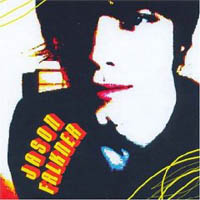
So sometimes, my records have such a wide palette because of that mentality. It’s not just, “This is me and I just do this one thing.” There are a lot of bands, like the Ramones—who are brilliant; I love the Ramones—but they just did one thing. Even big bands like R.E.M., they just kind of do one thing. That’s never been the case with me and it probably never will be. I realize that’s confusing for some people.
Popshifter: I think you get pegged as being “Power Pop” but I don’t really get that. I think nobody knows what to do with your sound.
Jason Falkner: Exactly. I’ve been kind mislabeled into that power pop thing. I find that most people considered power pop right now, I don’t want to listen to them at all. Power pop has turned into this thing where bands, just because they go (sings) “ooh la la la” in the background. . . it’s like, this kind of shameless Beatles thing that’s not working. (laughs)
This is why I was so thrilled to get the chance to play with Air. Like, really? I’m just this power pop guy? I’m playing with a French electronic band. I’m not a power pop guy.
I love what power pop means to me. Like The Who.
Popshifter: When I think of power pop, I think of Cheap Trick, but they’re not really power pop.
Jason Falkner: They’re a rock and roll band.
Popshifter: I guess it would be more like The Raspberries.
Jason Falkner: Yeah, they’re severely power pop. Then there’s that whole New Wave power pop thing like 20/20. But most of that stuff I’m just not that into. It’s a real limiting title. And so I don’t really think about that at all when I’m working. I think people might consider me power pop because there are a lot of twists and turns in the music and it’s almost a post-punk thing.
And that is what I like.
Popshifter: In the interview you did with Under The Radar last year, there’s a quote from Linda Rapka who says that you don’t have any lukewarm fans. When people mention your name other people “get it” and there’s an instant camaraderie. When you work with other musicians are there bands that you share fandom of, where certain things don’t need to be explained?

Jason Falkner: Oh yeah, there’s a whole bunch. Like the first three Brian Eno records, that’s kind of like a password. If you’re hip to those records and you like them, then very little needs to be said about a certain musical choice. And as far as newer bands, I like Midlake and The Shins. Another one for me is David Bowie. It kind of all boils down to David Bowie for me. On so many levels.
I can love something but I might never sound like it. That’s kind of intentional. It’s out of respect; I don’t want to go too close to something that I love because it’s just too obvious. I’d rather just be inspired by them on different levels, like visually. Visually I’m inspired by Bowie. I’m inspired by such forward-thinking artistry. And never being pigeonholed. From the Ziggy Stardust album to the German era, those are completely different things and they’re only four or five years apart.
I’m inspired by that more. The British Invasion was a completely new art form although it was considered more of nuisance by a lot of people. Except for kids. You could feel that it was new.
That’s why revolutionary scenes need to happen. They need to kick out what’s become common and stir it up and announce that there’s something else we can all be doing. Every major movement in music has done that, like American punk and then British punk and rap and hip hop.
The problem is that there doesn’t seem to be anything left that can really be a revolution. Like a band with fifteen people onstage all dressed in white?
Popshifter: Oh, like the Polyphonic Spree? (laughs)
Jason Falkner: Yeah, there are so many bands like that right now, it’s really laughable. To me that’s not a scene. That’s just a weird trend that’s ridiculous. First of all, how are any of you people making any money?
Popshifter: (laughing) That’s hilarious.
Jason Falkner: (laughs)
Popshifter: In that same interview, it was mentioned that some of your favorite bands have never achieved substantial notoriety and you were asked if you think you are like that. You mentioned how as a kid you were drawn to things that weren’t everyone’s favorite and that’s still how you are now. In fact, you even said that you would go away from things that may have been good for you just because everybody else was doing it.
I thought that was one of the coolest things I’d ever read. I also think it’s really honest because it could potentially alienate people. The interviewer addressed that and you said you didn’t necessarily want to reach everyone. That’s a really brave thing to say. A lot of people will cater to what they think people want to hear but then they don’t necessarily make quality music that is long-lasting.
Popshifter: Do you think that’s caused any friction in your career?
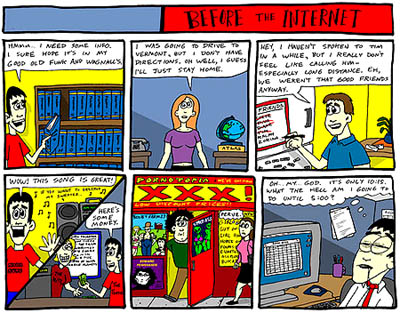
A Welsh View: Before The Internet © 2004
Jason Falkner: I don’t know, I don’t know what the effect of my attitude is. I just know that when I look around at what’s happening in pop culture I’m kind of appalled.
Popshifter: (laughs)
Jason Falkner: I don’t care about those people; I don’t want them to be at my show. I’d rather keep it like a private club where it’s more special. You can’t just gain admittance, you know, you have to understand it. That’s how I grew up when it came to music and film that I liked.
I grew up when it was harder to get access to information. Pre-Internet life was a really different story. I mean, you couldn’t even find the frickin’ shoes that you wanted.
Popshifter: (laughs)
Jason Falkner: I tried to find the shoes that The Undertones were wearing—which we called “monkey boots”—forever! I finally went to London when I was 16 and the first person I saw wearing them was a 70-year-old double-decker bus driver. And I pointed down at his shoes and I was like, “Where the hell did you get those? Those are punk rock boots!”
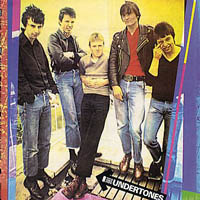
The Undertones
And he’s like (adopts London Cockney accent), “What’re you talkin’ about, mate? These cost five pounds!” And they were Yugoslavian military boots. That’s kind of a silly example.
Popshifter: No, when you’re 14 or whatever, that’s a big deal.
Jason Falkner: Yeah, it’s a big deal. When you had to search something out, you really appreciated it.
Popshifter: Yep!
Jason Falkner: Just going to vinyl shops and digging through boxes of seven-inches, looking for some gem that you wanted, that was really exciting. It’s just different looking it up online or downloading it from some music site or even ordering it.
It’s like “click.” Yep, I ordered it; it’s in the mail. It’s just a different thing. That’s something I really am glad I experienced and I’m glad I’m old enough to have been around before that. You’re a part of the experience; your own choices are a part of the experience. As opposed to being able to type something into Google.
As far as taste in music and art, I developed my own taste and style from a really isolated place. It was my vision of a utopia; that’s what I was always trying to create. So it doesn’t surprise me at all that a lot of people now wouldn’t really get what I’m doing. I mean a lot of the mass consumers.
I think anyone with a desire to hear something a little more interesting would, if they got the chance to hear my music, find something about it that they like or love. I’m not speaking to the people who watch Entertainment Tonight.
Popshifter: (laughs)
Jason Falkner: At all.
Popshifter: Or TMZ.com.
Jason Falkner: No, even worse, yeah. I could (pause) care less.
Popshifter: Couldn’t? (laughs)
Jason Falkner: This is the funny thing. Some people say, “I could care less.”
Popshifter: I know, but I think that’s grammatically incorrect, isn’t it?
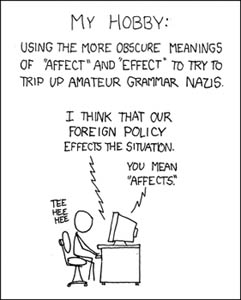
Effect An Effect © xkcd
Jason Falkner: Okay, so how about this one: I could or couldn’t give a shit.
Popshifter: (cracks up)
Jason Falkner: Because people say both. Neither really work. (laughs) That’s my favorite expression.
Popshifter: I agree with you that that’s a big problem with pop culture today, that maybe there isn’t the same affection or appreciation for things as there was maybe 20 years ago.
Jason Falkner: There are just so many choices now. And in a way, that means that maybe there are fewer choices, you know what I mean?
Popshifter: Do you hate freedom? Come on, now. (pause) I’m just joking.
Jason Falkner: I’m a Communist, man! No, but you know what I mean. There are just so many things flooding every kind of entertainment market. Obviously, large record companies. . . those were just a crooked thing from their inception. Run by people who didn’t really care about the artists. Although obviously there were exceptions like Richard Branson, Chris Blackwell, or even Rick Rubin. Generally speaking—and I’ve been doing this for a while and I’ve met with every single large record maverick—they’ve all kind of disappointed me.
It’s a good thing that’s kind of waned and artists are more in control of promoting themselves, like over the Internet. For better or worse, record companies were a barometer for what they thought would sell. The good people, like those I mentioned before, were a barometer for what was good to release. And that’s a really important issue that I never hear anybody talking about.
It kind of drives me crazy. Just because you want to be good, doesn’t mean that you are.
Popshifter: (laughs)
Jason Falkner: Just because you have the desire, or you have a good record collection, or you read Mojo—
Popshifter: (laughs again)
Jason Falkner: —it doesn’t mean that you’re very good. But your average person, because society has been dumbed down to such a point, your average person hears their friend’s band that goes (sings) “ooh la la la” and they’re like, “It sounds like the Beatles!”
So you have this real regression. Also because there’s so many options out there and you can actually drum up major business just with MySpace, if you work your ass off on it, which I clearly don’t. (laughs) I probably should but it’s just too time-consuming.
I guess the point I’m making is that when there was a little less to consume, but a bit more quality control. . . well, here’s an example.
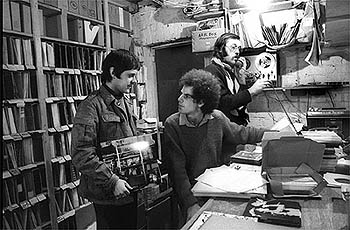
Rough Trade, 1978
Photo © Jill Furmanovsky @ RockArchive.com
The label Rough Trade: I used to buy anything that was on Rough Trade because I knew they had a kind of politics.
Popshifter: Yeah, like Some Bizarre or Mute.
Jason Falkner: Yeah, Some Bizarre. . . or SubPop. At SubPop there were just two guys who were deciding what was going to be released on that label. It wasn’t just because there was a band in Seattle. . . (laughs) okay, I should take that back.
Popshifter: (laughs)
Jason Falkner: In the early ’90s, if you were a band in Seattle, even if you’d just moved there from Kansas. . .
Popshifter: (laughs)
Jason Falkner: But you know what I’m saying. I think it’s good when there is an entity that releases music that has style and standards. That being said, I would never sign to a label right now.
Popshifter: I also think that the term “pop culture” has become abused. I was just telling someone today, that when I tell people I’m into music, they’ll say these stupid things like, “Oh, well, do you watch American Idol?”
Jason Falkner: Exactly.
Popshifter: And it’s like, “NO!” (laughs) “Why would you think that?”
Jason Falkner: Yeah, it’s like, “Did I stutter? I said I was really into music.”
Popshifter: (laughs) Every dumb band that they hear on Top 40, they’ll ask, “Oh, don’t you like them? I thought you were into music?”
Jason Falkner: “Oh, you got the new Daughtry record?”
Popshifter: (laughs) It’s like, “I’m into food, but I’m not going to eat McDonald’s Filet-o-Fish all day long.”

Jason Falkner: I’m. . . I mean, I’m speechless from that because that is just such a problem. Even my mom, bless her, will be like, “American Idol!” and I’m like, “Oh my god. . . Mom! Do you know who your son is?”
Popshifter: (cracks up)
Jason Falkner: “Do you know who I think I am?” No. . . but it’s really tragic.
I’ve had some friends call me and say, “Hey, I talked to somebody and we could submit your songs to American Idol.” I don’t even call them back!
I mean, are you kidding me?! Have you never listened to what I do? Do you think I would be into that? (laughs)
I mean, I’m broke, but I’m not that broke. There is no “that broke.” That’s like, I’d make that decision in a crazy, rare moment of like, sleep deprivation and (laughing) gnarly alcohol poisoning—
Popshifter: (cracks up)
Jason Falkner: —and then maybe kill myself after.
Popshifter: Since pop culture is at such low point, is there anything current—or even not current—that’s inspiring you or making you happy?
Jason Falkner: Whenever I’m asked what I’m into I can never think of anything. Although there is an artist named Banksy who I think is amazing and who’s doing really interesting, culturally-critical work. I think there is a crop of people who all kind of feel the same. There is definitely a bubbling up of complete dissatisfaction with what has happened to pop culture.

Jimmy Page
Photo © Neil Zlozower
I like some new bands that remind me of other things. Like Vampire Weekend. It’s pretty sweet, kind of like early XTC and there’s even some Haircut 100 in there (laughs).
It’s like walking into a record shop. Right when I park my car, it’s like, “I’m gonna get this and this and this.” And then I walk in and it’s like, “What the hell did I want?” And I just (sighs) go over to the Bowie vinyl section again. “Yep, I already have that, already have that.”
Popshifter: (laughs) I’m the same way. What is next for you and what are you working on now?
Jason Falkner: Right now I’m rehearsing and the band is playing a show on July 17. After that, we’re going to Japan to play Fuji Rock. That’s going to be really exciting. It’s a big festival. I’m OK. . . You’re OK has only been out in Japan thus far. When I went there last fall, it was really amazing. They’re not afraid to be fans there. Which is really refreshing because I’m from L.A.—
Popshifter: (cracks up)
Jason Falkner: —where people are afraid to stick their necks out and enjoy something unless everybody is enjoying it. In Japan, they’re fans. There’s a real healthy separation between stage and audience, which I like.
When I was a kid I never thought I could run up and grab Jimmy Page’s guitar. Are you kdding? I couldn’t even get close to those guys. It’s still kinda like that in Japan.
And then I’ll be coming back here and working on another solo record. I’d like to get I’m OK. . . You’re OK on iTunes very soon. The next record will be done by the end of the year and out by the beginning of next year.
Additional Resources:
Bedtime With The Beatles Part 2 is now available on iTunes, Napster, Rhapsody, and Amazon. For more information on Jason, please visit his MySpace page.
2 Responses to “Creating Utopia: An Interview With Jason Falkner”
September 4th, 2008 at 5:13 am
Hey Less,
Good news – I just published a phone interview I did with Jason late last month. Your interview is awesome, and it set the bar really high, so I tried to do the best that I could in return. During the interview, we cover news about a new album, talk about what it was like for Jason to work with Paul McCartney, and go over lots of songwriting info about his marvelous album “I’m OK… You’re OK.” Check it out at http://blog.palopop.org/2008/09/final-cut-exclusive-interview-with.html.
Best,
-Phil Andrews
Palo Alto Pop Overthrow
http://www.palopop.org/
February 2nd, 2010 at 7:47 pm
[…] Electrocution included a link to our 2008 Jason Falkner interview in his post titled, “DJ Shadow writes about file […]
Time limit is exhausted. Please reload the CAPTCHA.